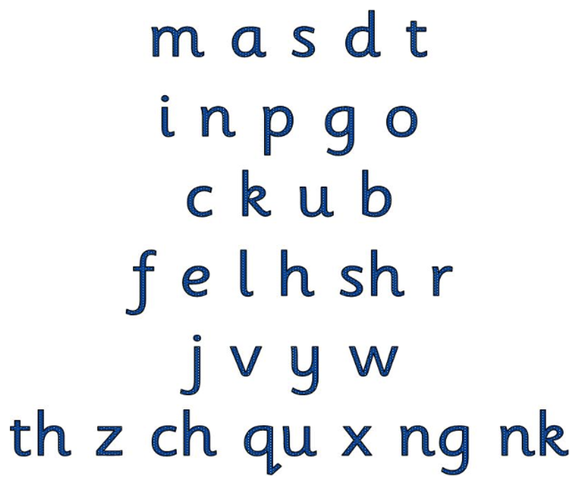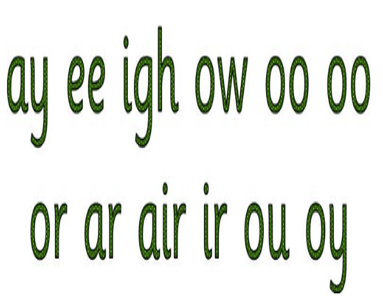
English
Phonics
Here at Woodlands, staff are committed to the teaching of phonics at the correct level for our pupils and consider that it is vitally important that children have a secure understanding of the letter sounds and spelling system of English. Phonic skills need to be developed in a systematic, staged approach in order to help all children to ‘achieve their potential’.
At Woodlands, we follow the Read Write Inc Phonics programme, which is a method of teaching reading and writing, centered around learning the sounds of the letters (phonics) and then blending them together to read words. The children also learn to break down words into individual sounds in order to write them.
How does RWI work at Woodlands?
The children in EYFS and KS1, and anyone in KS2 who did not pass the phonics screening check, are assessed and grouped according to their ability.
They work in small groups with teachers and teaching assistants for 20 minutes every day.
At the end of each half term the children will be assessed again to check they have made progress and will be grouped again. In addition to the Read Write Inc programme the children will also be working on writing skills and storytelling in their classes with their own class teacher.

When using RWI to read the children will:
Learn to read effortlessly so that they can put all their energy into understanding what they read.
Learn 44 sounds and the corresponding letter/letter groups using simple picture prompts.
Learn to read words using Fred Talk.
Learn to read words by blending the sounds together.
Read lively stories featuring words they have learnt to sound out.
Show that they understand the stories by answering 'Find It' and 'Prove it' discussion questions.
When using RWI to write the children will:
Spell effortlessly so that they can put their energy into working out what they want to write.
Learn to write the letters/letter groups which represent the 44 sounds (graphemes).
Learn to write words by saying the sounds in Fred Talk.
Write simple sentences.
Talking
When using 'Read Write Inc' the children work in pairs to:
Answer questions to practise every activity.
Take turns talking to each other.
Give positive praise to each other.
Blending
Children learn to read words by blending the letter-sounds that are in the Speed Sound sets.
Help your child learn to read words by sound-blending e.g. c-a-t = cat
Help children to say the pure sounds, as quickly as they can, and then to blend the sounds together to say the whole word.
Set 1 sounds

Set 2 sounds

Set 3 sounds

Pronouncing the sounds correctly-
http://www.ruthmiskin.com/en/parents/
Children will be introduced to ‘Ditty books’ when they successfully begin to read single words. The short vowels should be kept short and sharp:
Children use sound-blending (Fred Talk) to read short ditties. They will bring these home once they have read and discussed the book in class. Children will then be challenged to use their developing phonic knowledge to write short sentences.
Within all the books children will have red and green words to learn to help them to become speedy readers. Red words are words that are not easily decodable and challenge words to extend children’s vocabulary. Green words are linked to the sounds they have been learning and are easily decodable.
Dots and dashes represent the sound each letter or group of letters makes.
During the RWI session children will read the book three times and at each new reading they will have plenty of opportunities to use their developing comprehension skills.
Spelling
Spelling will only start in Reception when children are ready to write and form their letters. Children will use ‘Fred fingers’ to first sound out a word before they write it down. Children learn how to spell rather than just get tested. Furthermore, this way of teaching spellings allows children to use Fred fingers whenever they get stuck with spelling a word. Children pinch each sound on fingers before writing the word.
If you have any questions about RWI, please see Mr Spink
Reading
Progression of skills, knowledge and understanding in word reading
Progression of skills, knowledge and understanding in comprehension
Reading of individual words & short sentences is taught through the phonics work & the two go hand in hand. In each class there are daily Book Talk sessions where staff use a range of books to develop pupils individual reading and comprehension skills, 4 times a week.
Children are given the opportunity to read both fiction and non fiction texts.
In Key Stage 1, pupils take home a Book Bag book, from the RWI level they are on.
Reading books beyond phonics
Once pupils have completed Read Write Inc phonics, they will be assessed to identify a reading age. They will then be able to select a book to bring home from an appropriately leveled selection. Parents are expected to comment in home reading diaries each week. Reading ages are tested each term to ensure pupils continue to access the correct level of challenge from their reading book.
Suggested books to read
Writing
Writing Overview
Writing Long Term Plan
Progression of skills, knowledge and understanding in narrative
Progression of skills, knowledge and understanding in non-fiction
Progression of skills, knowledge and understanding in sentence types
Handwriting skills ladder
Writing is taught through stories and films, where various genres are taught (fiction, non-fiction, poetry, play scripts etc). The teachers also make strong links to writing in other areas of the curriculum for example asking children to write a scientist or historian. Writing assessments are carried out and the children are given constructive feedback on their 'next steps' of learning. Handwriting is taught several times a week where children learn to write cursively-joining from year 2.
Spelling
Spelling Long Term Plan
Spelling is taught through specific spelling sessions, and starter lessons to English lessons. Children are taught spelling patterns, rules and statutory word lists. All children have weekly spelling lists to learn at home and take part in a weekly spelling test in school. Children are expected to know the statutory word lists for their specific year group. Children's spelling results are monitored and rewards are given to pupils who consistently achieve well. Children use Spelling Shed as online platform for learning their spellings.
Grammar
Grammar Overview
Grammar Long Term Plan
Progression of skills, knowledge and understanding in grammar
Grammar is taught both discretely and as a routine part of the every English unit. In their writing sequence, children learn to apply grammatical features to develop their final text .

